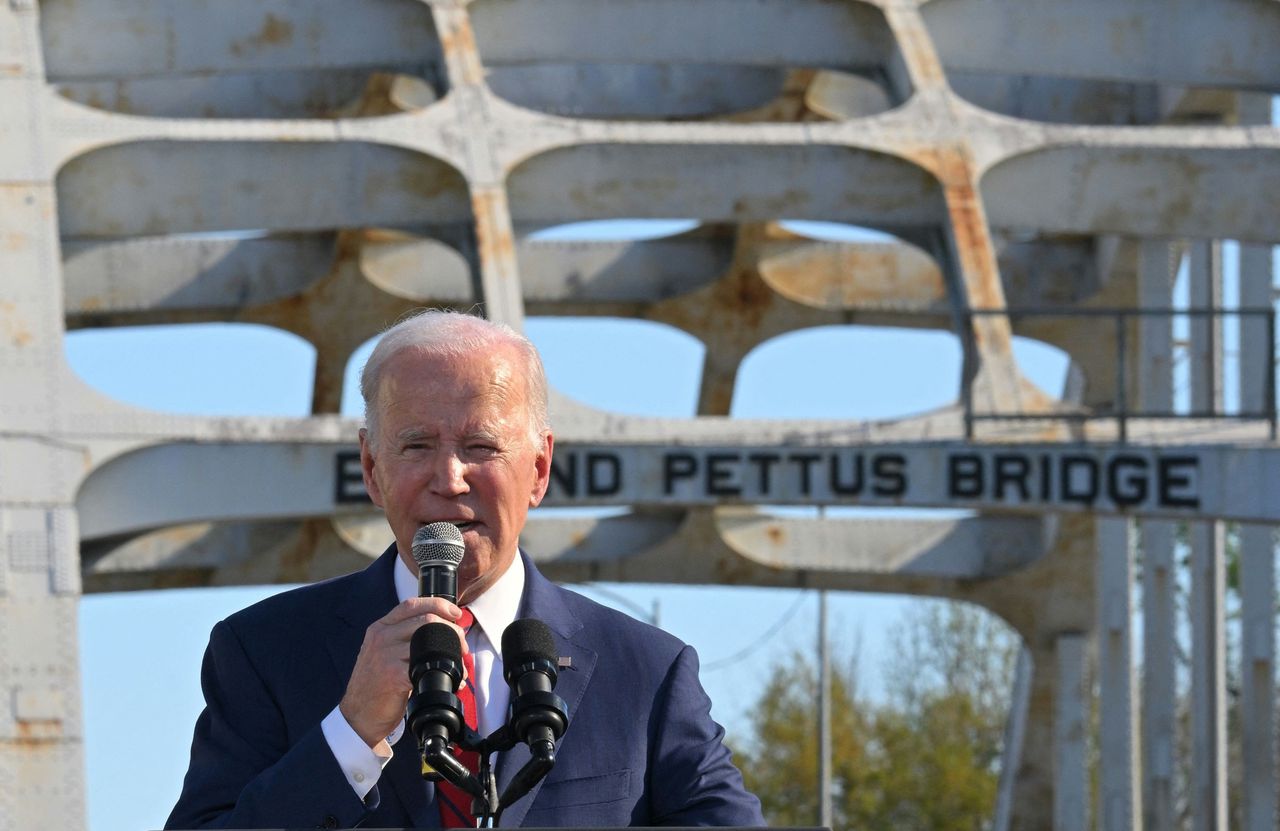Joe Biden visits Selma on ‘Bloody Sunday’ anniversary, calls for protecting voting rights
Marchers crossed the Edmund Pettus Bridge in Selma today to commemorate the 58th anniversary of “Bloody Sunday,” the day in 1965 that white police beat Black civil rights marchers as they attempted to cross the bridge to gain the right to vote.
President Joe Biden arrived in Alabama on Sunday morning. He addressed the crowd soon before the crossing, speaking to the nation about the protection and expansion of voting rights, and specifically calling for the John Lewis Voting Rights Advancement Act and Freedom to Vote Act to be passed.
“The right to vote and to have the vote counted is the threshold of democracy. This fundamental right remains under assault,” said Biden, who referenced the Supreme Court Case Milligan v. Merrill, where judges are deciding on the constitutionality of Alabama refusing to provide another majority Black congressional district. “We will not let a filibuster obstruct the sacred right to vote.”
The president also spoke on banning assault weapons, better funding for HBCUs and called on congress to restore the full child tax credit.
Biden spoke about efforts to help Selma rebuild after the Jan. 12 storm that devastated the city. He promised the city would be fully reimbursed for its cleanup efforts and Selma and Dallas County would continue to receive direct support through the American Rescue Plan and Inflation Reduction Act.
“We know there is work to do to recover from this,” he said of the storm. “We’ll be here as long as it takes. “
The president walked alongside foot soldiers from the civil rights movement like Bernard Lafayette and local and national lawmakers, including Montgomery mayor Steven Reed, U.S. Senator Rapahel Warnock, former senator Doug Jones and U.S. House of Representatives members Maxine Waters, Sheila Jackson Lee and Jim Clyburn.
The president arrived before the Jubilee events Sunday morning at the Maxwell Air Force Base, where he was greeted by U.S. Representative Terri Sewell (D-AL).
“I want you to know that during this time of crisis we need your help,” said Sewell about recovering from the January storm. “We need everything in Selma, Alabama. We are committed to rebuild not only better but fairerer and to reimagine what Selma can be,” said Sewell.
The EF-2 tornado that hit Selma mostly avoided the parts of the city where the Jubilee events are held, but ultimately destroyed about 40% of neighborhoods and displaced hundreds of residents, according to the mayor. Some of the people who lost their homes have been staying in hotels, but were again displaced this weekend when visitors came from out of town.
“Some of those that were in hotels are being displaced because the hotels had long term reservations for people who were in attendance to the Jubilee. And so we are working to try to identify places for them to stay. So there’s still a lot of human suffering going on as a consequence of this storm,” said Mayor James Perkins.
Nine people were killed in Autauga County by that storm. There were no deaths or serious injuries in Selma.
The mayor predicts about 70% of the storm debris has been picked up ahead of the Jubilee. A feat, he said, that would not have been possible without the declaration from the president and federal government to reimburse all of the city’s cleanup efforts.
“It was originally projected that this project would take somewhere between 15 to $20 million. That was nearly the total budget for the city of Selma; and really there was no way for us to achieve that clean up and have the cash flow for day to day operations for our municipal government,” said Perkins. “Federal and state assistance is very critical and key to the success of this cleanup.”
But Perkins says the city still needs a lot more. Prior to the storm, Selma had an immediate infrastructure need estimated at $500 million to help restore and develop the city, one of the oldest in the state, and combat the blight that is marked by the abandoned storefronts and homes in the city’s downtown and surrounding neighborhoods.
Decades of disinvestment and white flight have made Selma the fastest shrinking city in Alabama, losing nearly 2% of its population between 2020 and 2021. Between 2010 and 2017, the population shrunk by 11.5%. No other city in the state is close to Selma’s decline.
On Sunday, there are few signs of the storm apart from signs with QR codes asking for donations to the city’s relief fund and a number of FEMA workers with the agency branded on their shirts.
But like Sewell, Perkins says he hopes the president and other out of town visitors who come for Jubilee events will focus on the needs of Selma this weekend.
“Selma has literally done more for this nation than it could ever do for itself. And the nation owes Selma and you know, my goal is to ask that the nation pays what it owes,” said Perkins.
Phyllis Kitchens-Thurmond visited Selma for the first time today from Atlanta and stood at the front of the crowd awaiting the crossing.
She didn’t see much damage except for a few trees fallen on businesses, but what she did see will stay with her.
“When I go back to Georgia, I’m going to do what I can for Selma. This is a city that needs our help, deserves our help, and is so important in our history and for our future,” said Kitchens-Thurmond.
